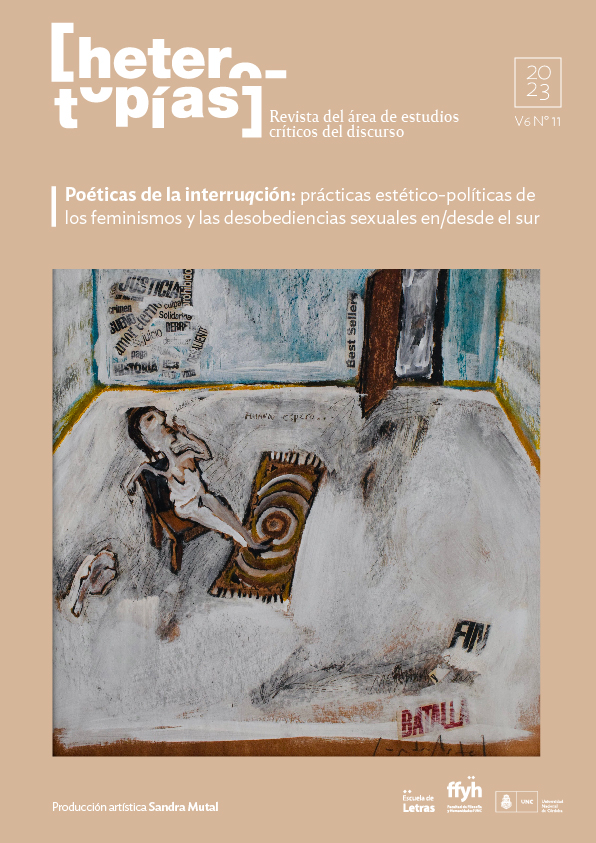Wastelands and bodies in the open of Argentine literature
Main Article Content
Abstract
In this article, we propose to study corporality from narratives produced and enunciated from feminisms and sexual disobediences of the present in two literary works: Chicas muertas (2014) by Selva Almada and Los Topos (2015) by Félix Bruzzone. For this, the objective is to analyze the configuration of the wasteland space where violent and exterminating practices are exercised such as femicide and transvesticide that in these writings operate as crucial facts that are placed at the center of aesthetic-political and social debate. These practices of interruption that occur in an outdoor space, are linked to death and abuse, having a strong impact on aesthetics and criticism that involve affections and destroy becoming. The methodology for understanding contemporary subjectivity posed what these two literary narratives represent, contemplates the approach of Néstor Perlongher on minority becoming and also the proposal of the feminist philosopher Rosi Braidotti who starts from the theoretical lines formulated by Michel Foucault, Gilles Deleuze and Luce Irigaray to support the importance of the so-called libidinal economy of the subject and theories of nomadism, corporality and feminisms. The contribution of this analysis allows to open horizons of reflection around contemporary corporal and scriptural practices enunciated from the south, giving innovative perspectives on critical positions and new feminist contributions and sexual disobediences contemplating the wasteland space as the privileged space to place the transvestite and feminine body face to the helplessness feeling.
Downloads
Article Details

This work is licensed under a Creative Commons Attribution-NonCommercial-ShareAlike 4.0 International License.
Those authors who have publications with this journal, accept the following terms: Those authors who have publications with this journal, accept the following terms:
a. The authors will keep their copyright and guarantee to the journal the right of first publication of their work, which will be simultaneously subject to the Creative Commons Attribution - Non-Commercial - Share Alike (by-nc-sa) Attribution License; no commercial use of the original work or any derivative works is allowed, the distribution of which must be done with a license equal to the one that regulates the original work.
b. Authors may adopt other non-exclusive license agreements for the distribution of the published version of the work (e.g., deposit it in an institutional telematic archive or publish it in a monographic volume) provided that the initial publication in this journal is indicated.
c. Authors are allowed and recommended to disseminate their work through the Internet (e.g. in institutional telematic archives or on their website) before and during the submission process, which may lead to interesting exchanges and increase the number of citations of the published work. (See The effect of open access).
How to Cite
References
Almada, S (2014). Chicas muertas. Buenos Aires: Random House.
Amícola, J. (2002). Camp Followers. Estética Camp y nueva carnavalización. CELEHIS-Revista del Centro de Letras Hispanoamericanas. Año 11 - Nro 14, Mar del Plata, páginas 167-175. Recuperado de https://fh.mdp.edu.ar/revistas/index.php/celehis/article/view/572
Andermann, J. 2018. Tierras en trance. Arte y naturaleza después del paisaje. Santiago: Metales Pesados. 462 páginas
Anderson, B “Affective atmospheres”, Emotion, Space and Society 2 (2009) 77–81. Recuperado de https://www.sciencedirect.com/science/article/pii/S1755458609000589
Basile, T. (2017). El cuerpo en la producción cultural de HIJOS e hijos. Saga (7), páginas 24-48. Recuperado de http://www.memoria.fahce.unlp.edu.ar/art_revistas/pr.8372/pr.8372.pd.
Bianchi, P “Fugacidades sexo afectivas, líquidas y baldías”. Revista chilena de literatura, Mayo 2020, N. 101, p. 71-101. Recuperado de https://revistaliteratura.uchile.cl/index.php/RCL/article/view/57311/61198
Bizzarri, G (2020).“Performar” Latinoamérica. Estrategias queer de representación y agencia-miento del Nuevo Mundo en la literatura hispanoamericana contemporánea. Milán: Ed. Di/segni.
Bourdieu, P. (2006). La dominación masculina. España: Anagrama.
Braidotti, R (2005). Metamorfosis. Hacia una teoría materialista del devenir. Madrid: Ediciones Akal.
Bruzzone, F. (2012) “Cómo limpiar la basura de la memoria”. Suplemento cultural Ñ. Clarín. 27 de Enero. Fecha de acceso: 2/10/2022.
__________ (2014). Los topos. Buenos Aires: Random-House Mondadori.
Butler, J (2018). Cuerpos que importan. Sobre los límites materiales y discursivos del "sexo". Barcelona: Paidós.
Caminada Rossetti, Lucía (2018). Devenir memoria. Cuerpo-Estado, sexualidad y política(s) en la literatura argentina contemporánea. X Seminario Internacional Políticas de la memoria. CC Haroldo Conti, Buenos Aires. Recuperado de http://conti.derhuman.jus.gov.ar/2018/01/seminario/mesa_15/caminada_mesa_15.pdf
Deleuze, G; Parnet, C. (1980). Diálogos. España: Pre-textos.
Frow, John “Individuos Distinction: Waste, difference, and classy stuff”. In: Hawkins, G; Muecke, E; Muecke, S (2003). Culture and waste. The creation and destruction of value. Rowman and Little field, Oxford. pp 29-38. Foucault, Michel (2007), Historia de la sexualidad I. La voluntad de saber. Ciudad de México, Siglo XXI Editores.
Giorgi, Gabriel (2004). Sueños de exterminio. Homosexualidad y representación en la literatura argentina contemporánea. Rosario: Beatriz Viterbo.
Jelin, E (2002). Los trabajos de la memoria. Buenos Aires: Siglo XXI.
Nofal, R (2015). Configuraciones metafóricas en la narrativa argentina sobre memorias de la dictadura. Kamchatka, nº6, diciembre, pp. 835-851. Recuperado de https://ojs.uv.es/index.php/kamchatka/article/view/7603.
Perlongher, Néstor (2016). Los devenires minoritarios. Diaclasa.net, Barcelona.
________________ (2002): Prosa Plebeya. Buenos Aires: Colihue.
________________(1987): O negócio do michê: a prostituição viril. São Paulo: Brasiliense.
____________________(1999) El negocio del deseo. La prostitución masculina en San Pablo. Paidós, Buenos Aires.
___________ (1997). Poemas completos (1980-1992). Buenos Aires: Seix Barral
Premat, J.(2017). Bruzzone y el deseo de literatura. HeLix 10, S. páginas 214-233. Recuperado de https://journals.ub.uni-heidelberg.de/index.php/helix/article/view/42032.
Sarduy, Severo (2011). El barroco y el neobarroco. Buenos Aires: Cuenco del Plata.(Apostillas de Valentín Díaz).
Sontag, S (1984) “Notas sobre los camp”. En: Contra la interpretación y otros ensayos. Barcelona: Seix Barral. pp. 303-331.
